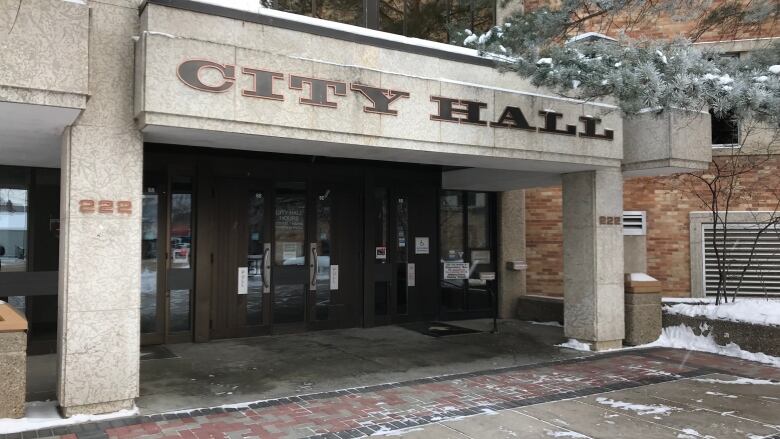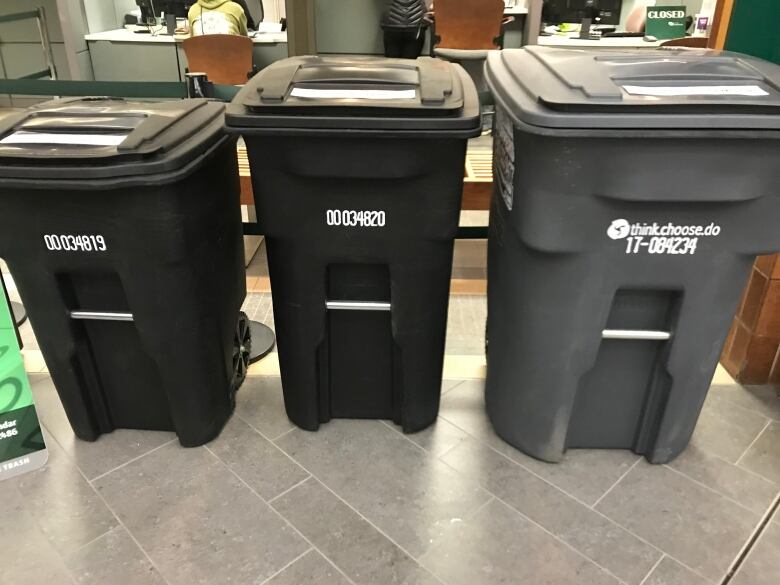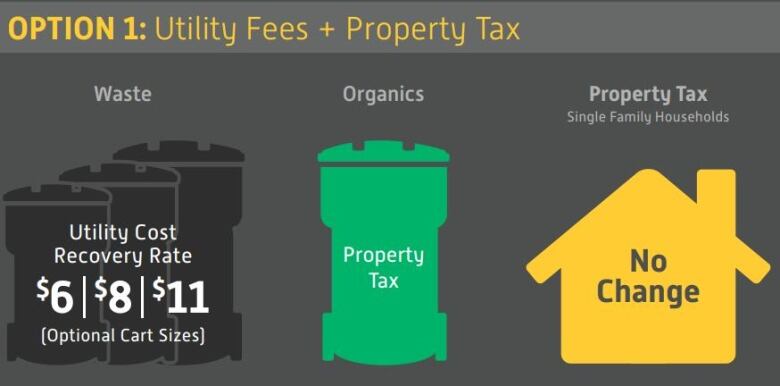7 questions about Saskatoon's new garbage and organics collection system
The final monthly cost to homeowners remains unclear

On Monday, city councillor Hilary Gough said the decision to move toward monthly billing for bi-weekly garbage pickup "will be a big change" for Saskatoon homeowners.
"I'm sure there will be some growing pains," she said of the plan, which also includes a move toward city-wide organics pickup.
"We have lots more to figure out," she added.
Indeed, there are some things we know and some things we don't. Here are some key questions lingering afterMonday's shakeup:
What's garbage pickup going to cost single-family households?
We don't know for sure.
Final price points won't be approved by councillors until early 2019, but the city has released some preliminary figures.
The smallest of the three black garbage bins to be offered by the city, capable of holding as much as 181.7 litres of refuse, would cost $6 a month, or $72 a year, if the proposed prices are approved.
Bins two and three (242.2 litres and 364 litres) would cost $8and $11a month, or $96 or $132 a year.
Bin three is the same size as the lone bin type currently in circulation.

Burnaby, B.C., which has a population just 14,000 people shy of Saskatoon's 246,376, came up as point of comparison Monday.
Like Saskatoon, Burnaby charges monthly fees for garbage pickup (based on four different bin types) but rolls the cost of its organics program into its property tax.
Below is an annual price point comparison with Burnaby, using the early Saskatoon estimates (in bold) and also throwing in a large city, Toronto, for further perspective. The Toronto figures factor in a rebate provided by that city. The list is organized in descending order of bin size.
- Toronto Size 1 (75 litres): $27.65 a year.
- Toronto Size 2 (120 litres): $145.38 a year.
- Burnaby Size 1 (120 litres): $25 a year.
- Burnaby Size 2 (180 litres): $75 a year.
- Saskatoon Size 1 (181.7 litres): $72 a year.
- Toronto Size 3 (240 litres): $347.44 a year.
- Burnaby Size 2 (240 litres): $205 a year.
- Saskatoon Size 2 (242.3 litres): $96 a year.
- Toronto Size 4 (360 litres): $486.99 a year.
- Saskatoon Size 3 (364 litres): $132a year.
- Burnaby Size 3 (460 litres): $385 a year.
What's the startup cost for the city?
About $13.6 million, although that figure will likely be revised now that city councillors have voiced their preference for the split-funding model, as opposed to a recommendation from city administration to putboth organics and garbage on one bundled monthly bill.
How many city workers is it going to take to run the city-wide organics program?
17.2, but three of those positions would be filled by moving nine currently seasonal workers into full-time jobs, so it would be a net increase of 14 jobs.
That's only if the city ends up doing the organics collection, though. It's possible that the company chosen to process organics also does the collecting. That's yet to be determined.
City organics pickup workers would pull double duty as garbage collectors.
"The trucks used for one would be used for another," said Russ Munro, director of the city's water and waste stream.
What's the effect on the property tax?
For Option 1 which is what city councillorsvoted through by a slim 6-5 margin on Monday there would be no change to the tax for single-family households.

That's different from the city's recommended bundled bill model,whichwould have actually lowered property taxes for single family households by 3.5 per cent,according to the city.

Why aren't we using a Pay As You Tip system?
Several city councillors raised this point, concerned about people being charged a flat fee instead of a fee that reflects the actual amount of garbage in their bin.
Munro said Saskatoon knows of only one other citythat charges by weight and it's a small one. Workers log the numbers by hand, he said.
Saskatoon would not consider manual measuring like that, Munro said, but the cost of a Pay As You Tip would be "significantly higher" than pay-as-you-throw, according to fellow staffer Dan Willems.
"The logistics for us would be quite a bit more complicated with a city of our size," said Munro.
- Saskatoon councillors express concerns, questions about proposed pay-as-you-throwgarbage program
-
Saskatoon eyes banning glass bottles, jars from household blue bins
Calgary is moving toward a tipping model, Munro added.
Councillor Troy Davies said that presents a fact-finding opportunity.
"If we can maybe work with Calgary, just a suggestion, to see where they're going," he said. "Maybe even let them do some work on it and we'll contact them in a year or so."
What about the chips?
Davies mentionedthe electronic tags that are now built into the city's garbagebins, which allow the city to track a bin to a specific household.
The city spent a "significant" amount of money on those and it would be great if a future tipping system could make use of them, Davies said.
"Yes, we would use those chips,"Willemsassured him.
Is affordability a concern?
Yes. Ann Iwanchuk was perhaps the most vocal councillor on this point, going so far as to say the new fee system could be seen as "gouging" by some residents.
Gough too said she wanted to "alleviate the immediate financial burden on folks who don't own the highest value properties in our city."
But she said the decision to move organics collection onto the property tax roll, as opposed to making it a fee alongside garbage collection, was a "reasonable" step.












_(720p).jpg)


 OFFICIAL HD MUSIC VIDEO.jpg)
.jpg)



























































































